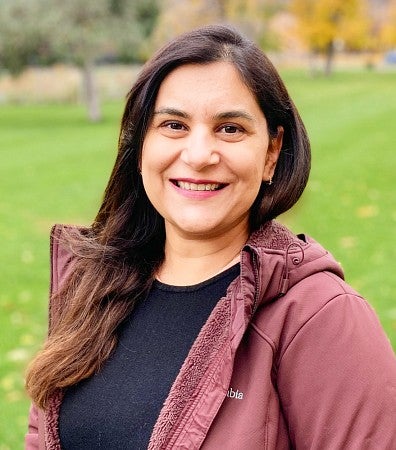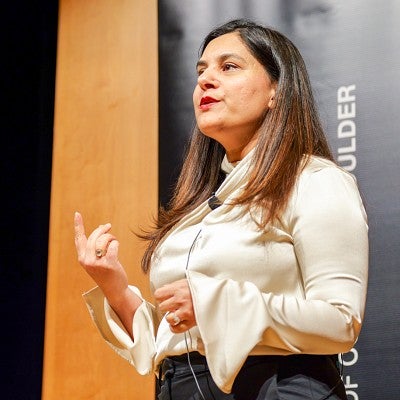
Saima Kazmi
Assistant Professor of Advertising
Hometown: I was born in Karachi, Pakistan. Today I have homes in Karachi, Dubai and now Oregon.
Primary research interest: My research focuses on advertising, consumer psychology and strategic communications. I am particularly interested in how consumers respond to sustainability messages.
Hobbies: I enjoy swimming, exploring new places and taking long walks while listening to podcasts.
Favorite author: I admire Yuval Noah Harari’s work, particularly “Sapiens” and “Homo Deus.” His work eloquently covers humans as they’ve evolved and shows how societal trends have developed to today.
Favorite artist: I enjoy Sufi music, particularly Abida Parveen’s music. I’m also drawn to older music, mostly songs with strong lyrical content.
Favorite podcasts: I enjoy “geeky” types of podcasts like “Philosophize This,” “No Stupid Questions” and various economic podcasts. My humor doesn’t always align with American humor in podcasts, so I prefer more philosophical and educational content.
Favorite quote: “The sun never says to the moon, ‘You owe me.’ Look what happens with a love like that. It lights up the sky.” —Hafiz
Unconditional kindness and generosity are so important, and it’s vital to remember that in your personal, academic and professional lives.
Say “hello!”: Connect on Linkedin.
To Saima Kazmi, understanding and experience are pivotal for effective communication. As a new assistant professor of advertising at the UO School of Journalism and Communication (SOJC), Kazmi brings a unique perspective shaped by her global experiences, academic success and professional expertise.
With a background rooted in both academia and industry, Kazmi aims to bridge the gap between theoretical knowledge and practical application. The belief that in-class lessons are pivotal building blocks for real-world success shaped her professional and academic journeys.
Before joining the SOJC advertising faculty, Kazmi was an instructor at University of Colorado (CU) Boulder and held various marketing positions. She holds an MBA and has extensive experience in analyzing brand data and developing strategic communication narratives. Her research focuses on consumer psychology and advertising, exploring how media messages influence consumer behavior. Kazmi values the importance of student engagement and having classes that offer real-life experiences. She believes showing up and participating are the only ways to succeed as a communicator, and there is no better place to build those habits than in a university environment. Having such an environment fosters collaboration and exploration, which allows students to not only explore personal interests, but also aid others in the same ventures.
Kazmi, in her own words, delved further into her career and projects.
Who has been the biggest influence on your career?
Saima Kazmi: My advisor and faculty at CU Boulder have contributed tremendously to my career trajectory. My biggest support, however, has been my husband. He works and lives abroad, in Dubai, but travels thousands of miles for my big moments — graduations and job interviews, anything. He’s been a phenomenal support and encourages me to never take my work or passions lightly.
Why did you decide to join the SOJC faculty?

SK: I was drawn to UO’s SOJC because of the overall vibe and culture. The faculty here are all very welcoming and collaborative, and the institution cares deeply about the environment and investing in the space they inhabit. The type of research they conduct aligns well with my interests, and I felt that there was a strong synergy between their work and mine.
What do you hope to accomplish here?
SK: Professionally, I am determined to achieve the goals laid out for tenure-track faculty, and, in every possible case, excel. Personally, I want to interact with students at different academic levels and across various fields within the SOJC. I hope to make a positive contribution and be remembered for something positive by my students and peers.
What do you hope students will gain from your classes?
SK: I want students to understand that what they are learning has real-world applications. Whether it’s academic concepts or practical projects, I want them to see how these can be applied in their professional and personal lives. Additionally, I strive to instill in them the confidence that they can succeed if they put in the effort.
What caused you to develop such a strong interest in strategic communications?
SK: My interest developed during my professional experiences as a marketing executive, when I analyzed data and built narratives around it. I wanted to explore the broader media interaction aspect of communication and understand how consumers respond to messages. This led me to pursue research and a Ph.D. program focused on advertising and consumer psychology.
Tell me about your recent doctoral thesis.
SK: My dissertation used experiments to understand consumer resistance to environmental ads — more specifically, how to design effective messages to overcome resistance to ads that challenge their habits. Professionally, I have worked in advertising and understand how consumer psychology can determine the kind of messaging consumers are likely to engage in. So most of my research in sustainability is informed by consumer psychology and behavior.
Impressive work is being done at UO in environmental communication and advertising. Some scholars and teachers at UO are actively working toward using the power of communication for good, and I am very excited about the possibility of contributing to it.
I am certain that UO would be an excellent place for me to develop and expand my teaching and research agenda.
What experiences have helped prepare you for this role at UO?
SK: Professionally, I have worked in South Asia with brands like Unilever and Nestle as my clients at an advertising agency where we handled their campaigns and digital communication. I had recently completed my MBA, so it was a great learning experience being in a small company yet getting to work with big household names.
I have worked on research projects and papers with scholars at CU Boulder and other universities, both in the U.S. and internationally, and most of them have been in the domain of sustainability.
Other than that, at CU Boulder, I was a finalist in the three-minute thesis competition, which basically involves talking about your dissertation to a general audience in under three minutes. It was great learning about presenting complex ideas in a manner that a 10-year-old could understand.
I also have a graduate teaching award from the University of Colorado; I received that for a course I taught on sustainability and brands.
What is something you want all students to know about you?
SK: In my classes your score starts at 100%. Your effort determines how you maintain it, otherwise you are working backward from there. I set high expectations for my students because the world is challenging, and college is a place to experiment and learn. And my goal is to help you be prepared for whatever comes next.
—By Ethan Donahue, class of ’26
Ethan Donahue is a journalism major with a double major in history. He is part of the School of Journalism and Communication’s direct-admit and honors programs. He is also part of the Clark Honors College. He holds an interest in investigative and conflict journalism and is working on a thesis focusing on how journalism, propaganda and the U.S. government interact during conflicts.
